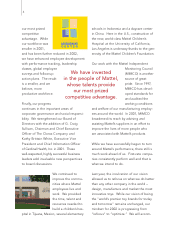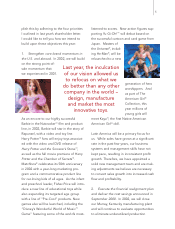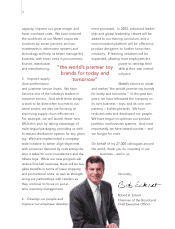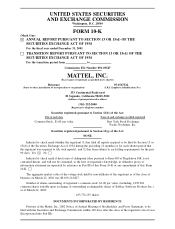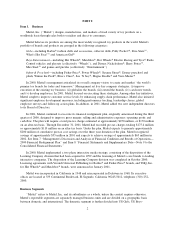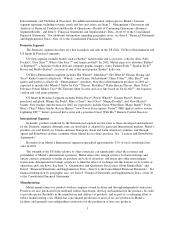Mattel 2001 Annual Report Download - page 16
Download and view the complete annual report
Please find page 16 of the 2001 Mattel annual report below. You can navigate through the pages in the report by either clicking on the pages listed below, or by using the keyword search tool below to find specific information within the annual report.conditions as the $1.0 billion revolving credit facility. Mattel has elected not to renew this facility when it
expires in March 2002, as it believes that cash on hand at the beginning of 2002 and its $1.060 billion domestic
unsecured committed revolving credit facility will be sufficient to meet its seasonal working capital
requirements in 2002.
The unsecured credit facilities and another $200.0 million term loan currently in place require Mattel to
meet financial covenants for consolidated debt-to-capital and interest coverage. Currently, Mattel is in
compliance with such covenants. See Item 7 ‘‘Management’s Discussion and Analysis of Financial Condition
and Results of Operations-Liquidity and Capital Resources-Seasonal Financing’’ and Item 8 ‘‘Financial
Statements and Supplementary Data—Note 4 to the Consolidated Financial Statements.’’
To meet seasonal borrowing requirements of certain foreign subsidiaries, Mattel negotiates individual
financing arrangements. Foreign credit lines total approximately $368 million. Mattel expects to extend these
credit lines through 2002. In the fourth quarter of 2001, Mattel entered into a securitization agreement with a
European bank to sell certain receivables of its French and German subsidiaries. Mattel also enters into
agreements with banks of its foreign subsidiaries for non-recourse sales of certain of its foreign subsidiary
receivables.
Mattel believes the amounts available from financing sources outlined above will be adequate to meet its
seasonal financing requirements for 2002.
Government Regulations
Mattel’s toy products sold in the US are subject to the provisions of the Consumer Product Safety Act and
the Federal Hazardous Substances Act, and may also be subject to the requirements of the Flammable Fabrics
Act or the Food, Drug and Cosmetics Act, and the regulations promulgated pursuant to such statutes. The
Consumer Product Safety Act and the Federal Hazardous Substances Act enable the Consumer Product Safety
Commission to exclude from the market consumer products that fail to comply with applicable product safety
regulations or otherwise create a substantial risk of injury, as well as articles that contain excessive amounts of
a banned hazardous substance. The Consumer Product Safety Commission may also require the recall and
repurchase or repair by the manufacturer of articles that are banned. Similar laws exist in some states and cities
and in various international markets.
Fisher-Price’s car seats are subject to the provisions of the National Highway Transportation Safety Act,
which enables the National Highway Traffic Safety Administration to promulgate performance standards for
child restraint systems. Fisher-Price conducts periodic tests to ensure that its child restraint systems meet
applicable standards. A Canadian agency, Transport Canada, also regulates child restraint systems sold for use
in Canada. As with the Consumer Product Safety Commission, the National Highway Transportation Safety
Administration and Transport Canada can require the recall and repurchase or repair of products that do not
meet their respective standards. In 2001, Fisher-Price announced plans to exit the car seat business.
Mattel maintains a quality control program to ensure compliance with various US federal, state and
applicable foreign product safety requirements. Notwithstanding the foregoing, there can be no assurance that
all of Mattel’s products are or will be free from defects or hazard-free. A product recall could have a material
adverse effect on Mattel’s results of operations and financial condition, depending on the product affected by
the recall and the extent of the recall efforts required. A product recall could also negatively effect Mattel’s
reputation and the sales of other Mattel products.
Mattel’s advertising is subject to the Federal Trade Commission Act, The Children’s Television Act of
1990, the rules and regulations promulgated by the Federal Trade Commission and the Federal
Communications Commission as well as laws of certain countries that regulate advertising to children. In
addition, Mattel’s websites that are directed to children are subject to the Children’s Online Privacy Protection
Act. Mattel is subject to various other federal, state and local laws and regulations applicable to its business.
Mattel believes that it is in substantial compliance with these laws and regulations.
8


